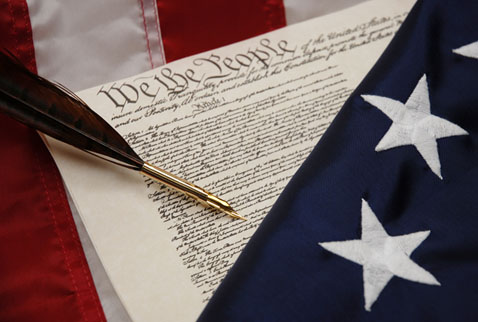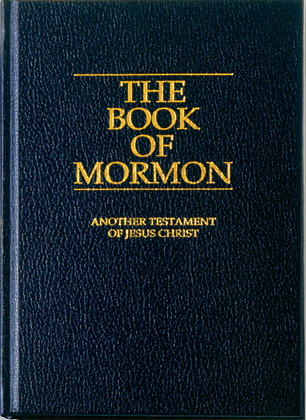A Canadian newspaper ran an editorial noting that Mormon beliefs about agency were valuable in understanding the importance of freedom in government. While the actual article was too partisan for the scope of this website, the basic premise—that freedom is a God-given gift—is an essential topic in evaluating the intersection of faith and government.
 Mormons believe God gave us our agency before we were born and that it plays an important role in the purpose of life. That purpose can be tied into why Mormons—and the Book of Mormon—teach that the United States played a divine role in God’s plan.
Mormons believe God gave us our agency before we were born and that it plays an important role in the purpose of life. That purpose can be tied into why Mormons—and the Book of Mormon—teach that the United States played a divine role in God’s plan.
Let’s start at the beginning, which was before the beginning, actually. Mormons (a nickname for members of The Church of Jesus Christ of Latter-day Saints) teach that we lived with God before we were born. He created our spirits and we lived with Him in a pre-mortal existence as spirits while we learned the gospel, built a relationship with God, and decided what sort of person we wanted to be, including whether or not God’s plan mattered to us.
Even there, we had agency, the right to make choices for ourselves. The most important choice came when God brought us all together to announce that it was time for the second phase of life. Like all children, we eventually have to leave home in order to find out who we really are and how we will choose to live when our parents aren’t right there with us. God warned that we would not remember our time in Heaven, but we would be given the Light of Christ to help us recognize truth when we heard it, if we were interested in finding truth. We could choose for ourselves whether or not to accept God and His gospel once we found it.
Lucifer tried to overthrow the plan. He went to work to convince everyone to refuse God’s plan and to instead let Lucifer take charge. He would make sure we made it safely back to Heaven by controlling our every thought and action, ensuring we would accept the gospel (or his version of it) and be able to return home sinless. There would be no need for Lucifer to come to earth and suffer for us, something he was not likely very interested in. He revealed his reasons for his idea when he said that in return, we would have to worship him instead of God. One third accepted this idea and they, along with Lucifer were cast out of Heaven and denied the ability to come to earth or to benefit from the atonement they rejected. Jesus Christ volunteered to come to earth to atone for our sins, giving God the glory. The rest of us accepted this.
That act of agency got us started. Here on earth we are free to search for truth or not, to accept it or not. We are free to obey God’s commandments or not—but not to disobey without consequences. Agency is not consequence-free. Life is not consequence-free.
So what does all this have to do with the United States? The Declaration of Independence, while not legally binding, outlines that Americans believe in freedom. The Bill of Rights protects specific freedoms. This model of democracy has been followed to some extent by many other nations. It also made it possible for people to have religious freedom. While the early government did not always respect the right to religious freedom, its place in the Constitution has allowed the religious to fight to protect their right to practice their religion. Freedom of religion created an environment in which Mormonism could come into existence and flourish, although not without difficulty and even official government persecution. Still, in time, we became more committed to those freedoms and today, most religions can live safely and peacefully.
The Doctrine and Covenants is a book of modern revelations given to Mormon prophets, most from the early days of the church in the 1800s. During a time of persecution, the Lord explained:
And now, verily I say unto you concerning the laws of the land, it is my will that my people should observe to do all things whatsoever I command them. And that law of the land which is constitutional, supporting that principle of freedom in maintaining rights and privileges, belongs to all mankind, and is justifiable before me. Therefore, I, the Lord, justify you, and your brethren of my church, in befriending that law which is the constitutional law of the land; And as pertaining to law of man, whatsoever is more or less than this, cometh of evil. I, the Lord God, make you free, therefore ye are free indeed; and the law also maketh you free (Section 98).
In December of 1833, the Mormon persecution was intense. The law was not protecting them at all and they had been driven from their homes, abused, and even murdered—often without consequence to their tormentors. Joseph Smith sought a revelation to help him understand why this was happening and God said:
According to the laws and constitution of the people, which I have suffered to be established, and should be maintained for the rights and protection of all flesh, according to just and holy principles; That every man may act in doctrine and principle pertaining to futurity, according to the moral agency which I have given unto him, that every man may be accountable for his own sins in the day of judgment.
Therefore, it is not right that any man should be in bondage one to another.
And for this purpose have I established the Constitution of this land, by the hands of wise men whom I raised up unto this very purpose, and redeemed the land by the shedding of blood (Section 98).
In this section, they were taught to support all constitutional portions of the Constitution. While Mormons believe the Constitution was inspired in order to preserve agency, Mormons have differing ideas on which portions are inspired. Dallin H. Oaks, a Mormon apostle, is considered the most qualified speaker on the Constitution within the Church. He was a State Supreme Court justice and helped to draft the Bill of Rights for the Illinois Constitutional Convention in 1970.
He explained:
Personally, I have never considered it necessary to defend every line of the Constitution as scriptural. For example, I find nothing scriptural in the compromise on slavery or the minimum age or years of citizenship for congressmen, senators, or the president. President J. Reuben Clark, who referred to the Constitution as “part of my religion,” also said that it was not part of his belief or the doctrine of the Church that the Constitution was a “fully grown document.” “On the contrary,” he said, “We believe it must grow and develop to meet the changing needs of an advancing world. (See The Divinely Inspired Constitution by Dallin H. Oaks.)
In this article he listed the portions he considered inspired:
- Separation of powers (between branches of federal government)
- A written Bill of Rights
- Division of powers (between federal and state)
- Popular Sovereignty
- The rule of law and not of men.
He also noted that another past Mormon leader had a somewhat different list, demonstrating the ability to be Mormon and have differing ideas on the subject.
Mormonism is not an American religion. It is found worldwide and Mormons are taught to respect and honor their governments and their leaders wherever they live—but America, with its focus on agency, plays an essential role in its history.
About Terrie Lynn Bittner
The late Terrie Lynn Bittner—beloved wife, mother, grandmother, and friend—was the author of two homeschooling books and numerous articles, including several that appeared in Latter-day Saint magazines. She became a member of the Church at the age of 17 and began sharing her faith online in 1992.




Thank you for your article. It was well written and I appreciate you explanation of the LDS faith.